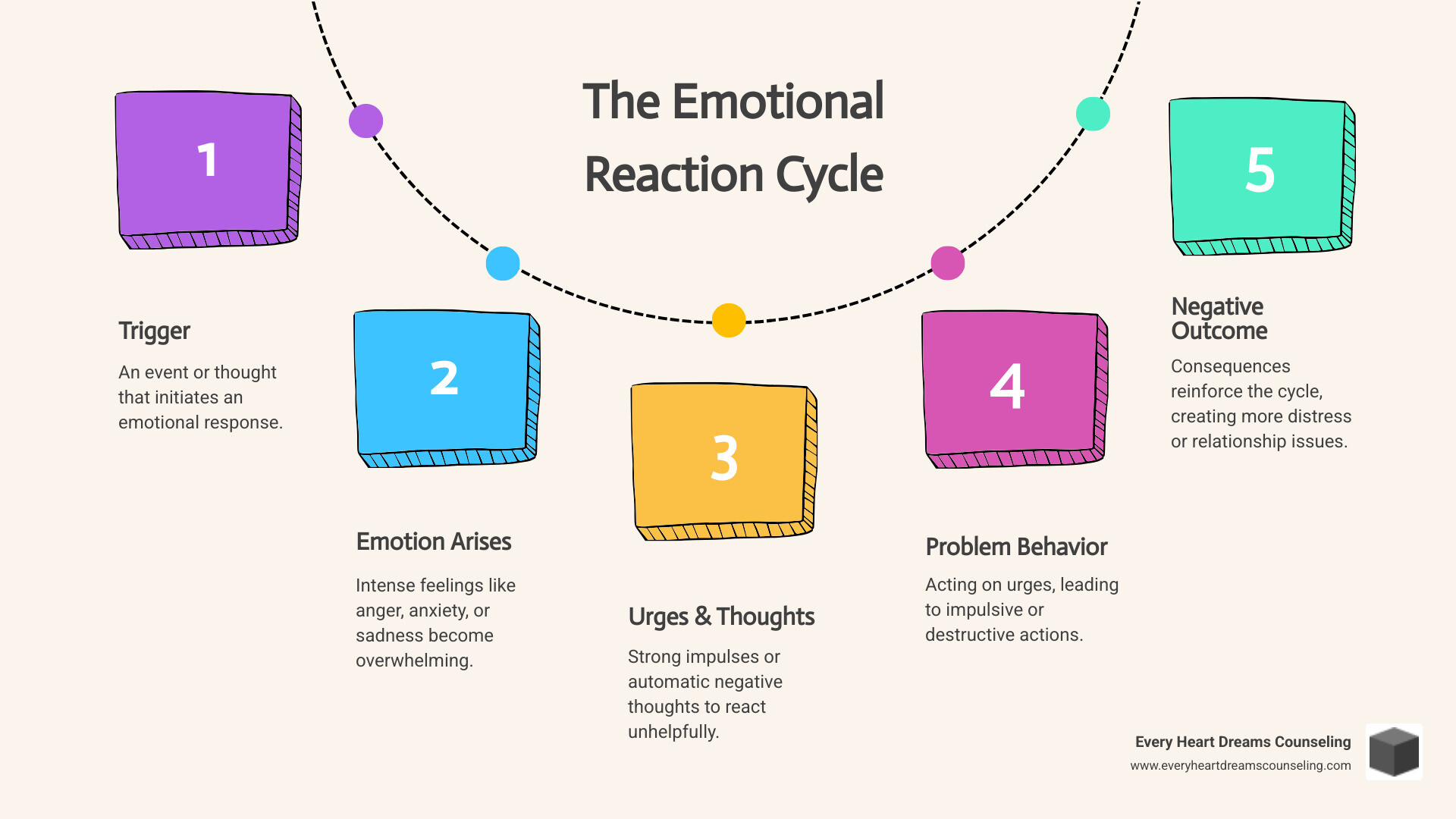DBT Therapy Emotional Regulation: Finding Calm in the Emotional Storm

Dialectical Behavior Therapy (DBT) therapy emotional regulation offers proven strategies to help you manage intense emotions and build healthier relationships. If you struggle with overwhelming emotions or relationship conflicts in the El Dorado Hills area, dialectical behavior therapy at Every Heart Dreams Counseling provides practical emotion regulation skills to create lasting change by helping you stay present, navigate difficult moments, understand your emotions, and communicate your needs effectively.
Dialectical behavioral therapy was developed by Marsha Linehan in the late 20th century as a comprehensive approach to mental health treatment. This evidence-based psychotherapy is now widely used to treat a range of mental health conditions, including depression, anxiety, trauma, and various emotion regulation challenges that impact daily life.
Many people feel trapped in a cycle of intense emotions and negative emotions. You might react in ways you later regret, leading to guilt or distance in your relationships. While the raw feeling of an emotion may only last about 90 seconds, our thoughts and reactions can keep that emotional intensity going much longer.
Dialectical behavior therapy DBT is built on a "dialectical" approach, which means holding two seemingly opposite truths at once. Psychology teaches us that this approach recognizes you are doing the best you can, and you can learn new emotion regulation skills to build the life you want. This balance of acceptance and change is the foundation of this powerful, evidence-based therapy, designed to help individuals improve their everyday emotional experiences and relationships.
Understanding Emotion Regulation and Its Challenges
Emotion regulation is the ability to guide your feelings instead of being controlled by them. It's not about suppressing emotions, but learning healthier ways to respond to them. When feelings become overwhelming and intense, it's called emotion dysregulation. This can feel like you're no longer in control, leading to impulsive behaviors and relationship challenges.
Learning to manage emotions effectively is crucial to overall well-being. It helps you handle difficult situations, make thoughtful choices, and build meaningful connections. However, when emotions constantly feel overwhelming, it can create significant stress in your daily life and relationships.
Why is emotion regulation so challenging? For some, it's a matter of natural temperament and brain wiring. The biosocial theory in dialectical behavior therapy suggests that some people are born with higher emotional sensitivity. When this sensitivity is met with an invalidating environment—where feelings are dismissed or misunderstood—it can create ongoing struggles with emotional management.
We also develop automatic negative thought patterns, often rooted in early life experiences, that can trigger intense reactions before we even realize what's happening. A lack of healthy coping strategies, emotional overload from chronic stress, and common misconceptions about emotions (such as "showing feelings is weak") also make emotion regulation particularly difficult.
The Impact of Emotional Dysregulation on Your Life
When managing emotions becomes a persistent challenge, it can create ripple effects throughout your life. Intense emotional reactivity often leads to relationship struggles and communication breakdowns, creating distance and misunderstanding with the people who matter most to you.
To escape overwhelming emotions, some people turn to harmful behaviors that provide temporary relief but cause long-term complications. These impulsive decisions can leave you feeling deeply out of control and helpless against your own emotional experiences.
At Every Heart Dreams Counseling, our group practice understands how these emotional challenges can affect your ability to find authenticity in relationships and develop healthy coping strategies. We believe that with the right emotion regulation skills and personalized support, you can find both calm and meaningful connection in your life.

The DBT Approach: Balancing Acceptance and Change
What makes dialectical behavior therapy so effective is its core philosophy: dialectics. This means balancing two seemingly opposite concepts—acceptance and change. Dialectical behavioral therapy is a comprehensive form of psychotherapy grounded in psychological principles that honor both where you are now and where you want to be.
We learn to accept ourselves and our emotions exactly as they are in the present moment, without harsh judgment. This isn't about giving up or resigning yourself to struggle; it's about acknowledging your current reality with compassion. Simultaneously, we commit to changing the behaviors and thought patterns that create unnecessary emotional suffering in our lives.
Dialectical behavior therapy teaches that emotions are neither good nor bad; they are simply information. They are brief, natural responses that help motivate us and communicate our needs to others. A key part of this healing process is validation—recognizing that your feelings and reactions make sense given your unique experiences and circumstances.
Adopting this non-judgmental stance helps interrupt the painful cycle of feeling an emotion, then feeling ashamed or angry about that emotion. This approach of finding acceptance while working toward positive change is a powerful step toward discovering lasting emotional balance and reducing emotional suffering.
The Four Modules of DBT Skills Training
Dialectical behavior therapy emotional regulation is taught through four core skill sets that work together to build a more balanced, fulfilling life. At Every Heart Dreams Counseling, our experienced team guides clients through each of these essential modules with personalized attention and care through both individual therapy and group sessions.
Mindfulness: The Foundation
Mindfulness is the cornerstone of all dialectical behavioral therapy skills. This practice teaches you to be fully present and observe your thoughts and feelings without judgment. Rather than being swept away by emotional storms, mindfulness helps you step back and witness your experiences with greater clarity and wisdom. This crucial skill forms the foundation for all other emotion regulation skills.
Distress Tolerance: Weathering the Storm
These skills focus on getting through emotional crises without acting impulsively or making situations worse. Distress tolerance techniques help you survive intense moments and prevent impulsive decisions you might regret later, giving you space to respond more thoughtfully to challenging situations.
Emotion Regulation: Understanding and Managing Feelings
This module provides concrete strategies to understand, manage, and appropriately change intense or unwanted emotions. You'll learn to identify emotional patterns, reduce vulnerability to overwhelming emotions, and increase positive emotional experiences in your daily life.
Interpersonal Effectiveness: Building Healthy Relationships
These skills help you communicate your needs clearly, set appropriate boundaries, and build healthy relationships while maintaining self-respect and consideration for others. This module is particularly valuable for creating lasting, meaningful connections and improving social interactions.
Finding Your "Wise Mind"
Dialectical behavior therapy introduces the concept of three states of mind to help guide your decision-making process.
Your Reasonable Mind operates from logic and analysis. Your Emotion Mind is driven primarily by your feelings and impulses. Neither state is inherently problematic, but making important decisions from only one perspective can lead to outcomes you later regret.
The goal is to access your Wise Mind—the integration of both logical thinking and emotional awareness. This inner wisdom combines rational analysis, emotional information, and intuitive knowing to guide you toward choices that feel both sensible and personally meaningful.
Learning to recognize and access your Wise Mind is a fundamental skill that supports better decision-making in all areas of life, from relationships and career choices to daily interactions and self-care practices. This crucial aspect of emotion regulation helps you respond rather than react to challenging situations.

Core Skills for DBT Therapy Emotional Regulation
The heart of dialectical behavior therapy emotional regulation lies in learning to understand your feelings deeply and respond to them in healthier ways that support your long-term well-being and goals. At Every Heart Dreams Counseling, our group practice guides clients through the practical application of these transformative emotion regulation skills.
Step 1: Understand and Name Your Emotions
Before you can effectively manage an emotion, you need to clearly identify what you're experiencing. As noted researcher Dan Siegel explained, "If you can name it, you can tame it." This process of labeling emotions begins with mindful observation of your internal experience without immediate judgment or reaction.
Practice noticing the physical sensations, thoughts, and behavioral urges that accompany different emotions. Then work on describing your feelings with specific, nuanced language. Are you experiencing anger, disappointment, frustration, or hurt? Each emotion carries different information and may call for different responses.
It's also crucial to distinguish between primary emotions (your initial reaction to a situation) and secondary emotions (your reaction to your own emotional response, such as feeling ashamed about being angry). Often, these secondary emotions create the most suffering and interpersonal difficulty. Understanding this distinction is a primary component of effective emotion regulation.
Step 2: Use Practical DBT Emotional Regulation Strategies
Once you can identify your emotions clearly, you can apply specific dialectical behavior therapy strategies to manage them more effectively. These evidence-based techniques can help decrease emotional intensity over time and improve your overall quality of life.
Check the Facts: Examine whether your emotional reaction and its intensity match the reality of the situation. Sometimes our feelings are understandable but not necessarily justified by the current circumstances. Recognizing this distinction can help reduce unnecessary emotional suffering and negative emotions.
Opposite Action: When an emotion doesn't fit the facts or when acting on its urges would be harmful, practice doing the opposite of what the emotion tells you to do. For example, if you feel sad and want to isolate, reach out to a supportive friend. If you feel anger and want to lash out, speak calmly or take space to cool down. This powerful technique can gradually change your emotional patterns and teaches healthier ways to respond.
Problem-Solving: When your emotion does fit the facts (such as feeling anxiety before an important presentation), use this skill to identify the specific problem, brainstorm potential solutions, and take effective action to address the situation. This approach helps you engage constructively with challenges.
PLEASE Skills: This acronym helps you reduce your physical vulnerability to intense emotions by taking care of your basic needs:
- Physical illness: Address health issues promptly
- Low blood sugar: Eat balanced, regular meals
- Excess substances: Avoid mood-altering substances
- Adequate sleep: Maintain consistent, restorative sleep
- Stability through exercise: Engage in regular physical activity
Step 3: Reduce Vulnerability and Build Positive Experiences
Dialectical behavioral therapy isn't only about managing difficult emotions; it's also about actively building a life filled with meaning, joy, and emotional resilience. You can accomplish this by proactively reducing your emotional vulnerability while increasing positive emotional experiences.
Build mastery by regularly engaging in activities that make you feel competent and effective. This might include learning new skills, pursuing hobbies, or taking on manageable challenges that boost your confidence and sense of capability. These activities help decrease vulnerability to negative emotions.
Accumulate positive emotional experiences by intentionally scheduling pleasant activities—both large and small—and engaging with them mindfully. This helps create emotional balance and provides a buffer against life's inevitable difficulties.
These practices create a more stable emotional foundation and support lasting positive change in your daily experience and relationships while building emotional resilience.
Mastering Distress Tolerance: Navigating Intense Emotions
Mastering distress tolerance is a crucial component of dialectical behavior therapy that empowers you to face overwhelming emotions without turning to harmful behaviors or impulsive decisions. When negative emotions like anger, sadness, or anxiety feel too intense, it's natural to want immediate relief or to react automatically in ways you might later regret.
Distress tolerance skills help you recognize and label emotions accurately, understand their triggers, and respond with healthier strategies instead of reacting on autopilot. These skills focus on building emotional resilience—learning to weather emotional storms without making situations worse.
For example, when experiencing intense anger, you might use the dialectical behavioral therapy technique of "urge surfing," which teaches you to notice the impulse to act destructively, observe the emotional wave as it rises and falls, and allow it to pass without giving in to harmful urges or impulsive behaviors.
Mindfulness and intentional breathing are also powerful tools for calming both your body and mind during emotionally charged moments. These practices help you create space between the initial emotional trigger and your response, allowing for more thoughtful choices and better emotion regulation.
By developing distress tolerance skills, you can reduce emotional suffering and regain a sense of personal control, even when emotions feel overwhelming. Over time, these abilities help you manage triggers more effectively, make decisions aligned with your values, and build a life less dominated by emotional reactivity.
Building Interpersonal Effectiveness: Strengthening Your Relationships
Building interpersonal effectiveness is a fundamental aspect of dialectical behavior therapy that focuses on creating and maintaining healthy relationships in all areas of your life. These skills teach you how to communicate your needs and boundaries clearly, express emotions appropriately, and navigate social interactions with both confidence and respect for others.
Interpersonal effectiveness skills are particularly helpful for individuals who struggle with emotional reactivity or find relationships challenging. The dialectical behavioral therapy technique "DEAR MAN" provides a structured approach to assertive communication while maintaining self-respect and preserving important relationships.
This might involve calmly expressing your feelings to a family member, listening actively to their perspective, and working collaboratively to find solutions that honor everyone's needs and boundaries. These skills help you move beyond reactive patterns toward more intentional, effective communication and healthier social interactions.
By practicing interpersonal effectiveness regularly, you can reduce conflict, manage social stress more skillfully, and build stronger, more satisfying connections. These abilities are crucial for reducing misunderstandings and creating relationships that are supportive, fulfilling, and resilient through life's challenges.
Who Can Benefit from Learning DBT Skills?
While dialectical behavior therapy emotional regulation is particularly known for helping with intense emotional experiences, its practical emotion regulation skills offer value to many different people and situations. At Every Heart Dreams Counseling, our group practice works with a diverse range of individuals who benefit from these evidence-based techniques for various mental health conditions.
Dialectical behavioral therapy can be especially transformative if you experience emotions very intensely or feel frequently overwhelmed by your emotional responses. It's also incredibly helpful if your relationships feel consistently challenging or if you struggle with effective communication and boundary-setting.
Teens and young adults can develop essential lifelong coping skills to navigate developmental pressures with greater emotional resilience and confidence. Adults of all ages can learn to better manage daily stress, improve their emotional intelligence, and enhance their overall well-being and life satisfaction.
Parents often find dialectical behavior therapy skills invaluable for managing their own stress more effectively while modeling emotional intelligence for their children. This creates a calmer, more emotionally healthy home environment that benefits the entire family and teaches emotion regulation skills by example.
If you experience emotions that feel intense or overwhelming and want to develop healthier ways to cope more effectively, dialectical behavioral therapy offers a structured, proven path toward greater emotional balance and a more meaningful life.

Overcoming Obstacles on Your Path to Emotional Balance
The journey toward emotion regulation and healthier relationships rarely follows a straight line. Even with sincere commitment and consistent practice of dialectical behavior therapy skills, it's completely normal to encounter obstacles and setbacks along the way. Negative emotions, self-doubt, fear of change, and the pull of familiar patterns can all make progress feel challenging at times.
When setbacks occur, remember that they are a natural and expected part of the learning process. Instead of harsh self-judgment, use dialectical behavioral therapy skills like mindfulness to observe your thoughts and feelings with compassion and curiosity. Practicing self-compassion helps you respond to difficulties with kindness, transforming mistakes into valuable learning opportunities rather than sources of shame.
Reaching out for support—whether from your therapist, group sessions, or trusted loved ones—provides encouragement and fresh perspective when you need it most. At Every Heart Dreams Counseling, our team understands that healing happens in relationship and community, not in isolation.
Every step forward, including the difficult ones, contributes to building genuine emotional resilience. By acknowledging and working through obstacles with support, you continue moving toward reduced emotional suffering and increased ability to handle life's challenges with greater ease and wisdom.
Maintaining Progress: Staying Steady Through Life's Changes
Maintaining progress in dialectical behavior therapy requires ongoing commitment and regular practice of the emotion regulation skills you've learned. After making meaningful improvements in emotional regulation and relationship quality, it's crucial to keep these abilities active and growing in your daily life.
This might involve attending ongoing therapy sessions or group sessions, practicing mindfulness regularly, or dedicating time to self-reflection and self-care activities that support your emotional well-being. Consistency in applying dialectical behavioral therapy skills helps prevent regression and builds on the positive changes you've created.
Journaling and regular self-reflection are powerful tools for tracking your growth, celebrating progress, and identifying areas where you might benefit from additional support or skill development. Acknowledging small victories—like responding calmly in a stressful situation or communicating your needs effectively—reinforces positive changes and builds motivation for continued growth.
Staying connected with your therapeutic support system helps you navigate inevitable life challenges while maintaining accountability to your personal goals and values. Our group practice at Every Heart Dreams Counseling provides ongoing treatment and support for clients as they continue their journey toward lasting emotional health.
By consistently practicing dialectical behavior therapy skills and maintaining supportive relationships, you can continue reducing emotional reactivity, strengthening your connections with others, and maintaining a sense of balance even when life presents new challenges. Progress isn't about perfection—it's about showing up for yourself consistently and honoring the important work you've done for your emotional well-being.
Finding Professional Support: Getting the Care You Deserve
Finding the right therapeutic support is a crucial step in your journey toward emotion regulation and lasting positive change. A therapist experienced in dialectical behavioral therapy can offer the personalized guidance, structure, and understanding you need to develop and strengthen these life-changing emotion regulation skills.
When searching for professionals trained in dialectical behavior therapy, consider asking about their specific experience with this psychotherapy approach and how they integrate these techniques with your unique needs and goals. Every person's path to emotional health is different, and quality treatment should reflect that individuality.
At Every Heart Dreams Counseling, our group practice brings together multiple therapists with specialized training in dialectical behavioral therapy and complementary approaches like EMDR therapy, Internal Family Systems, and trauma-informed care. This collaborative model allows us to provide comprehensive, personalized treatment that addresses your specific challenges and strengths while teaching effective emotion regulation skills.
With appropriate professional support, you can develop the confidence and skills needed to manage emotions effectively, build healthier relationships, and create a life that feels more balanced and fulfilling. Remember that seeking help demonstrates strength and self-awareness, and you deserve compassionate, expert care throughout your healing journey.
Frequently Asked Questions about DBT Therapy Emotional Regulation
It's natural to have questions when considering a new therapeutic approach. Here are some common inquiries about dialectical behavior therapy emotional regulation and how it might help you.
How long does dialectical behavioral therapy take to work?
Learning and integrating new emotion regulation skills takes time and consistent practice. While some people notice improvements in managing distressing situations relatively quickly, the deeper benefits of dialectical behavior therapy—such as building lasting emotion regulation habits and creating a truly fulfilling life—develop gradually over time.
The timeline is unique for each individual, and your therapist will work with you to tailor the approach to your specific needs, pace, and life circumstances. Meaningful progress depends largely on your commitment to practicing the skills regularly in your daily life and relationships. This primary focus on skill practice is what makes dialectical behavioral therapy so effective.
Is dialectical behavior therapy different from traditional talk therapy?
While dialectical behavioral therapy is a form of psychotherapy, it differs significantly from many traditional therapeutic approaches. Dialectical behavior therapy is highly skills-focused, meaning therapy sessions emphasize learning and applying practical strategies for mindfulness, distress tolerance, emotion regulation, and interpersonal effectiveness, rather than only discussing problems.
Additionally, dialectical behavioral therapy is founded on dialectical philosophy, which balances concepts of acceptance and change. This "both/and" thinking helps you move beyond feeling stuck in old patterns. While dialectical behavior therapy shares some foundational principles with other evidence-based approaches, its emphasis on acceptance, mindfulness, and managing intense emotions makes it uniquely effective for many people with various mental health conditions.
Can I learn dialectical behavior therapy skills independently?
There are many excellent books and online resources for learning about dialectical behavioral therapy skills, and these can certainly be helpful supplements to professional treatment. However, working with a qualified therapist or participating in group sessions offers significant advantages that self-study cannot replicate.
A trained therapist provides personalized guidance, helping you apply the most relevant emotion regulation skills to your unique challenges and life circumstances. The therapeutic relationship offers a safe, validating environment to practice new skills and receive non-judgmental feedback and support.
Professional treatment provides the accountability, structure, and expert guidance that are often crucial for creating lasting change, particularly when addressing complex emotional patterns or relationship difficulties. For example, learning to distinguish between primary emotions and secondary emotions often requires professional guidance to master effectively.
Begin Your Journey to Emotional Balance in El Dorado Hills
Taking the first step toward emotion regulation and healthier relationships is an act of courage and self-care. At Every Heart Dreams Counseling, we understand that dialectical behavior therapy emotional regulation skills can be truly transformative, and our experienced group practice is here to support you throughout your healing journey.
Our welcoming office in El Dorado Hills provides trauma-informed care that honors your unique story while equipping you with practical, evidence-based emotion regulation skills for positive change. We believe that building a meaningful, balanced life is absolutely possible through personalized treatment that meets you exactly where you are today.
Our skilled therapists integrate dialectical behavioral therapy emotional regulation with other proven approaches like EMDR therapy, Internal Family Systems, and Brainspotting to create comprehensive, individualized treatment plans. This holistic approach ensures that your care addresses all aspects of your emotional health and personal growth while teaching you to manage emotions effectively.
From our convenient El Dorado Hills location, we serve individuals and families throughout the surrounding communities, including Cameron Park, Folsom, Placerville, and Sacramento. Whether you're a teen navigating developmental challenges, a young adult building life skills, or an adult seeking greater emotional freedom, our compassionate team is here to help you create lasting positive change and develop crucial emotion regulation skills.
Our group practice creates a safe, supportive environment where genuine healing can begin and flourish. We understand that every person's journey is unique, and we're committed to providing the individualized care and support you deserve, whether through individual therapy or group sessions focused on building dialectical behavioral therapy skills.
Don't let overwhelming emotions limit your potential any longer. Contact our caring team today to learn how our personalized, integrated approach to dialectical behavior therapy emotional regulation can help you discover greater emotional freedom and build the meaningful life you truly want. Your journey toward balance, connection, and authentic well-being starts with a single step—and we're here to walk alongside you every step of the way, teaching you the emotion regulation skills that will serve you for life.


